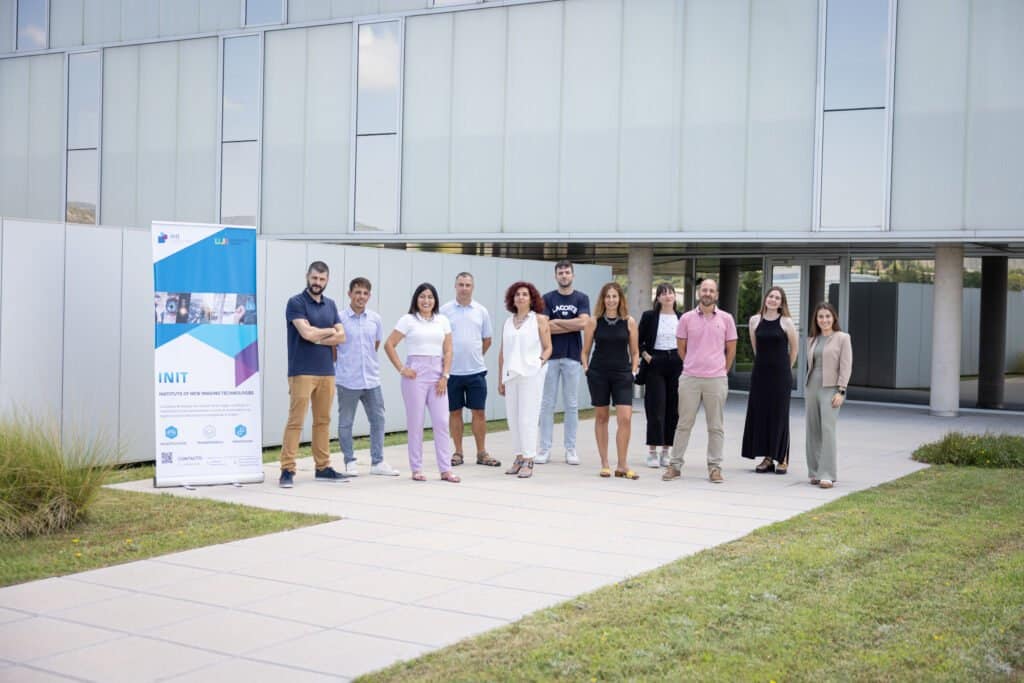The Jaume I University, through the "Interactive Visualization" research group of the Institute of New Image Technologies (INIT), coordinates the e-DIPLOMA project approved by the European Commission within the framework of the highest research and innovation program of the European Union, Horizonte Europe. e-DIPLOMA, which will be directed by Dr. Inmaculada Remolar, director of the INIT, has the main objective of developing a new platform for e-learning that will combine virtual reality, artificial intelligence, interactive technologies, chatbots and gamification. This project is the result of the Research Promotion Plan of the Universitat Jaume I launched by the Vice-Rector for Research and Transfer of the UJI.
The e-DIPLOMA project, made up of nine international entities, is endowed with 3 million euros for the next three years and will begin on September 1, 2022. The UJI leads the international consortium made up of the Tallinn University (Estonia), the Delft University of Technology (Netherlands), the Budapest University of Technology and Economics (Hungary), the Polytechnic university of Valencia (Spain), Innogrowth-European Association for Innovation and Growth (Bulgaria), the center CSI for social innovation (Cyprus), the training and research cooperative ARIS (Italy) and the company Brainstorm Multimedia (Spain). The Universitat Jaume I-Empresa Foundation of the Valencian Community also participates in the project as an entity associated with the UJI, to provide support in the dissemination and communication activities of the project.
In a first phase, the Horizon Europe e-DIPLOMA project will examine the strengths and weaknesses of the current European ecosystem of e-learning, as well as the benefits of the latest technologies for online training, especially in experiential learning. e-DIPLOMA will analyze the usefulness of disruptive technologies to support education and training systems, specifically in distance practical training and, therefore, the project focuses its analysis on the training levels of pre-university practical education (VET) and on higher education.
In the second phase of the project, following a methodology of co-creation, it will be determined which technologies are most appropriate to address different types of educational methodologies.
In the third phase, the platform that will be developed in e-DIPLOMA will host three educational modules that will integrate artificial intelligence, virtual and augmented reality, interactive technologies and gamification techniques and pilot experiences will be carried out in different countries so that, when evaluating the results obtained, cultural aspects can be considered.
Finally, in the fourth phase of the project, based on the results obtained previously, the platform will be redesigned and redefined. e-learning developed.
In a transversal way, it is also the object of study how the use of these new technologies and digitalization of training influence inclusion, accessibility and sustainability. To do this, an e-learning environment will be created that will avoid creating new inequalities between people and even countries. e-DIPLOMA will investigate the potential, opportunities, barriers, accessibility and risks of the use of emerging technologies for teaching, in order to support the digital transformation from the understanding of the social, ethical, political and economic impacts of digital practices. Another of the fundamental pillars of the project is the adequate training of teaching staff in relation to new educational technologies.
The e-DIPLOMA project has the support of associated entities such as the Provincial Council of Castelló (Spain), CECAP Valencia-Business Association of Training Centers of Valencia (Spain), Finnovaregio (Belgium), RESET-Social empowerment and transformation research and education (Cyprus), Florida Training Center (Spain), Estonian Education and Youth Board, IES Álvaro Falomir (Spain), Umbrian Regional League of Cooperatives and Mutuals (Italy), Satori Labs (France), János Neumann Computer Science Society (Hungary), Sofia University of Technology (Bulgaria), Professor Doctor Asen Zlatarov University (Bulgaria), Bulgarian-German Vocational Training Center (Bulgaria) and the company Senseglove (Netherlands).
In addition, the study and results of the e-DIPLOMA project will be supported by the international committee of experts made up of Vladislav Slavov, vice dean of the Sofia University of Technology (Bulgaria), Marini Catiuscia, head of the European Office of the Department of Policies, Training, Employment and International at Legacoop Umbria (Italy), Ülle Must, Director of Development at the Estonian Education and Youth Board, Dr. Tobias Ley, Professor at Danube University Krems and Tallinn University and Dr. Frédéric Mertens from Wilmars, expert and professor in European and Gender Issues with extensive experience in higher education. This is the union of top-level professionals who will work to create a new paradigm of online training, and to increase the resilience of the educational world linked to digital transformation.
Funded by the European Union. However, the views and opinions expressed are solely those of the author(s) and do not necessarily reflect those of the European Union or the European Research Executive Agency (ERA). Neither the European Union nor the authority that granted them can be considered responsible for them.



